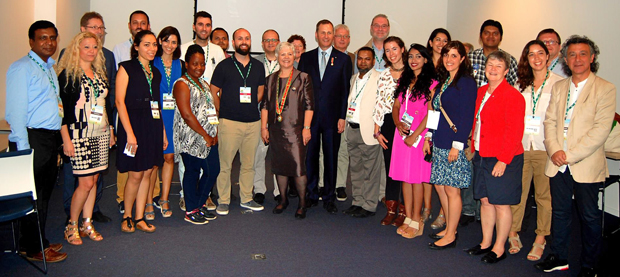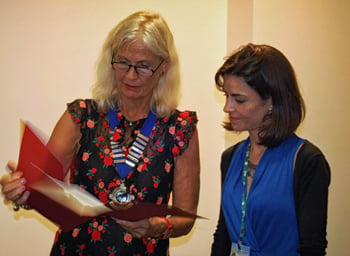Bursaries help colleagues to attend Rio
 Photo: WONCA World and WONCA Europe bursary winners at a reception in Rio with WONCA Europe executive members
Photo: WONCA World and WONCA Europe bursary winners at a reception in Rio with WONCA Europe executive members
Earlier this year, WONCA Europe and WONCA World organised a bursary call and offered funding for colleagues to attend the 21st WONCA World Conference. The 17 winners traveled to Rio de Janeiro, participated in the conference actively, and assisted a special award reception. The president of WONCA Europe, Anna Stavdal, noted during the ceremony: “We are delighted to support colleagues across Europe and from the rest of the world. We hope that the conference will be a source of inspiration and have a positive impact on their efforts to strengthen family medicine in their countries and local communities.”
Bursaries were sponsored by WONCA Europe and WONCA World. There was also a
Montegut Scholar from WONCA Europe region who was Dr Eunice Carrapiço from Portugal. (seen in the photo with new WONCA Europe President Dr Anna Stavdal). This award is sponsored by the American Board of Family Medicine Foundation (ABFM-F).
 European Bursary Winners
European Bursary Winners
1 Ana Costa -Portugal
2 Ana Luisa Neves -Portugal
3 Candan Kendir Copurlar -Turkey
4 Enrique Alvarez Porta -Spain
5 Helder Goncalves -Portugal
6 Juan Martinez Rodriguez -Spain
7 Oleksii Korzh -Ukraine
8 Radost Assenova -Bulgaria
9 Joana Guerra Silva -Portugal
10 Mariana Prudente -Portugal
11 Vikesh Sharma -UK
Non-European Bursary Winners
1 Martha Makwero - Malawi
2 Nana Kwame Ayisi Boateng -Ghana
3 Rahman Zakiur -Bangladesh
4 Liliana Laranjo - Australia
5 Vicky Ashutosh Sharma - India
6 Apurwa Prasad -Nepal
Montegut Scholar, Dr Eunice Carrapiço, has written a very long report for teh ABFM-F on her first WONCA conference attendance. Some of her impressions are:
"The experience was a highly fruitful and impressive one. My first positive and striking emotion was the sense of belonging to an enormous family of world family doctors, where visions, hopes, will, creativity and efforts can converge to improve health, human solidarity and well-being all over Earth.
I very much valued the impressive range of themes, perspectives and practical issues, going from policies, organizational issues, spiritual concerns and approaches in clinical practice, to clinical topics and precise practical procedures potentially offered in order to increase the utility of the action of the family doctor and his/her team in the caring of their patients. One example of this last point was that of periarticular infiltrations and myofascial syndrome treatment. Another crucial aspect was quaternary prevention and the concept of “not to do” recommendations to avoid damaging patients and increase their safety within health care services and systems.
I would like to highlight the message passed by Amanda Howe to consider the family doctor as a social change actor and author, which stresses the power of her/his example and concludes with “we all can be leaders”.